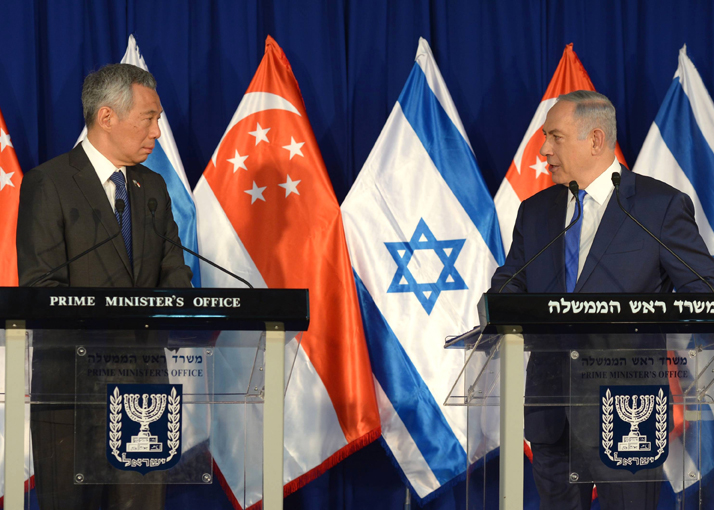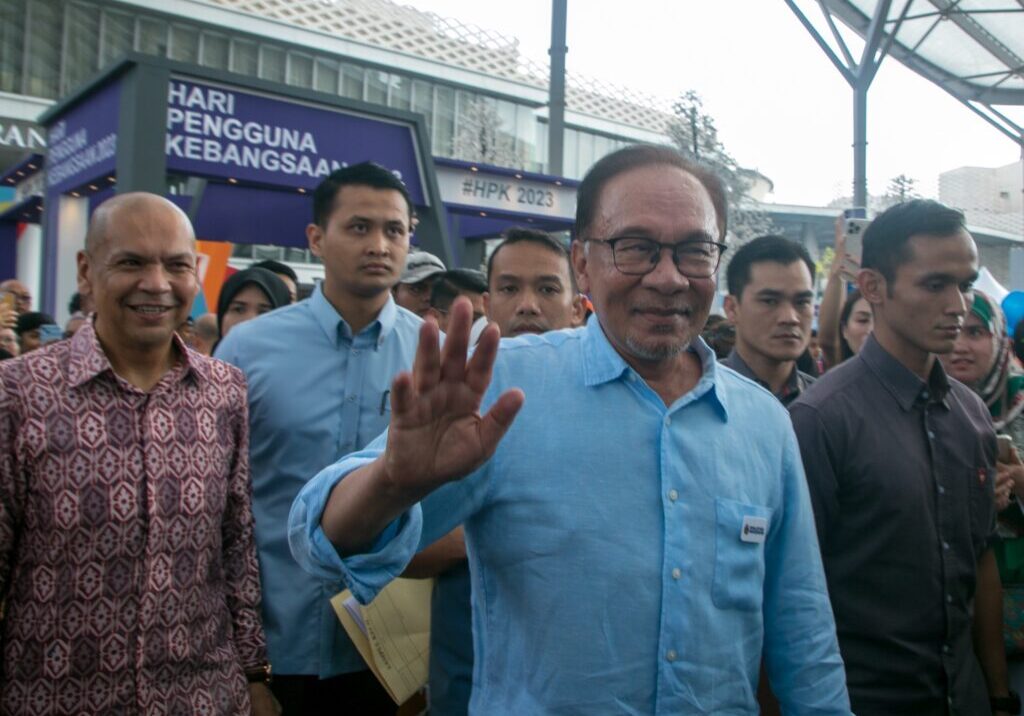Australia/Israel Review
Israel and Singapore – out of the shadows
Jun 1, 2016 | Sharyn Mittelman

Sharyn Mittelman
While, in the past, it was always kept low-key, Israel and Singapore have a deep and enduring relationship that has lasted more than 50 years. Not only do these two small but prosperous states at opposite ends of Asia have extensive cooperation in commerce and defence trade, but they share a profound political alliance whose roots can be traced back to the founding of Singapore in 1965. Today, that previously quiet and low-key relationship is finally coming out of the closet.
The new openness in the relationship was proudly on display on April 19, when Singaporean Prime Minister Lee Hsien Loong arrived in Israel for a historic four-day visit accompanied by a 60-member delegation. While bilateral diplomatic relations were formally established in 1969, it was the first time a Singaporean Prime Minister had visited the Jewish state. But it was not Prime Minister Lee’s first time in Israel – he came to Israel in 1977 as a young army officer accompanying his country’s then-Chief of Staff, Lt.-Gen. Winston Choo. Today, Choo is Singapore’s Ambassador in Tel Aviv.
In light of their warm ties, it may seem strange that it has taken this long for a Singaporean Prime Minister to visit Israel, but for many decades their friendship was kept quiet, with the extensive defence cooperation, in particular, kept secret. The friendship began when Prime Minister Lee’s father, Singapore founder Lee Kuan Yew, sought Israel’s help to enable Singapore to defend itself after it left the Malaysian Federation in 1965. Last March, Israel’s President Reuven Rivlin travelled to Singapore to pay his last respects to the legendary Singaporean elder statesman.
In meeting with Israel’s Prime Minister Binyamin Netanyahu, Prime Minister Lee expressed his gratitude towards Israel for its support in helping Singapore at that pivotal time – and in doing so acknowledged the extent of the relationship openly in a way no Singaporean leader would have done publicly until fairly recently. PM Lee said: “It all started with a defence relationship. We are very grateful to Israel that when independence was thrust upon us in August 1965 and when Singapore’s security and survival were in doubt, you helped us, the IDF helped us to build up the Singapore Armed Forces [SAF] when other countries turned us down.” According to reports, Singapore asked Israel to help build its armed forces after India, Egypt and Britain all declined.
And on receiving an honorary doctorate at Hebrew University, Prime Minister Lee said, “Without the IDF, the SAF could not have grown its capabilities, deterred threats, defended our island, and reassured Singaporeans and investors that Singapore was secure and had a future.” He added, “We will always be grateful that Israel helped us and stood by us at our time of great need.”
How did Israel help Singapore develop its army in such secrecy? According to reports, in 1965 Israel sent a military delegation to Singapore that included General Rehavam Zeevi (nicknamed “Gandhi”), Colonel Yaakov Elazari, Colonel Yehuda Golan and other officers to advise Singapore to form an army based on the IDF’s experience. The Israelis were called the “Mexicans” by Singapore’s government who wanted to hide their presence. Once the Israelis helped oversee the establishment of the Singaporean army, Israel reportedly sent weapons shipments.
Today Singapore’s army is considered one of the most powerful in Southeast Asia, and it is still modelled on the IDF, as Israeli security and intelligence expert Yossi Melman has commented: “The Singapore army was built, trained and equipped following the model of the Israeli army. Singaporeans are surrounded by Muslim countries, making their islands susceptible to paranoia. For this reason the State has developed a disproportionate military, broad and powerful. And from this point of view, their army is for them very similar to the Israeli army.”
The relationship between the Israeli and Singaporean defence establishments has also expanded to include cooperation between the two countries’ military industries. Singapore is now considered a key market for Israel’s military industries. According to Melman, Singapore attracts hundreds of former Israeli military and intelligence officers and hosts major security corporations including Israel Aerospace Industries, Rafael Advanced Defence Systems and Elbit Systems, as well as the Israeli Embassy with its military attachés. Israel reportedly continues to sell Singapore weapons including tanks, radars and drones, and the two nations’ military industries are known to cooperate in joint ventures for tenders in other countries, as well as in the research and development of new defence systems. They have also boosted their intelligence cooperation, working together to expose Islamist terror group cells operating in the region including Jemaah Islamiyah, Hezbollah, al-Qaeda and ISIS, who have variously sought to attack Singaporean, Western and Israeli targets.
Perhaps this unlikely friendship is less surprising than it initially appears given that the two countries share much in common. Both are small nations in size and population – Singapore sits on around 700 square kilometres and has a population of 5.5 million – 75% of Chinese descent, 13% Malayan Muslims and 10% Indians. Both countries are also surrounded by large Muslim nations – for Singapore its neighbours are Malaysia and Indonesia.
Israel’s Prime Minister Netanyahu mentioned their similarities and shared values in his welcome speech to Prime Minister Lee. He said:
“We have built dynamic, prosperous economies, despite our small size and our limited natural resources. The economic success of Singapore, I think, inspires the entire world. The transformation of Israel to a technological powerhouse on the global scene, I think, evokes a similar admiration…Today we are anchors of stability and strength in our respective regions…We obviously face many common challenges, foremost of which I think is the rampant terrorism that comes from militant and extreme ideologies that threaten us all… Prime Minister Lee, together we can better overcome our common challenges and seize our shared opportunities.”
Aside from defence cooperation, commercial collaboration between Israel and Singapore is also booming. In 2015 the two nations conducted around US$1.35 billion of trade, according to the Jerusalem Post. Prime Minister Lee also mentioned these developments in his address, stating, “Our business-to-business ties are strong. Israel is the second largest contributor of foreign direct investments in Singapore from the Middle East, and we admire your technical prowess and ecosystem.”
While in Israel, Prime Minister Lee witnessed the signing of agreements between Hebrew University and Singapore’s National Research Foundation, as well as with two universities in Singapore, to expand research and development cooperation. A memorandum of understanding concerning foreign aid, also signed during the visit, will see the two countries jointly “providing training in various spheres of development (economic development, innovation, health and sustainable development) to professionals from developing countries around the world.”
These developments expand on existing commercial collaborations including the Singapore-Israel Industrial R&D Foundation established in 1997, which is a joint venture between the Singapore Economic Development Board and the Office of the Chief Scientist in Israel to promote, facilitate and support joint industrial research and development projects between companies from Israel and Singapore, which would lead to successful commercialisation.
For Israelis, Singapore is an important access point into the Asian market, which also makes it a great launching pad for Israeli companies seeking to globalise their businesses. Singapore and Israel share an understanding of the need to develop wide international trade relations, in order to overcome geographical limitations. Today Singapore is a strategic hub for Israeli business and regional trade, as well as for opportunities for joint operations in areas including biotechnology, IT and software industries – industries in which both countries are seen to have an edge.
Their close economic and defence ties also appear to have born diplomatic fruit. In 1988, Singapore issued a statement welcoming the proclamation of a Palestinian state. However, today Singapore has generally adopted an even-handed approach to the Israeli-Palestinian conflict, calling both Israelis and Palestinians its friends. On his visit to Israel, Prime Minister Lee also met with the Palestinian Authority Prime Minister Rami Hamdallah, and called for renewed peace negotiations. During his address at Hebrew University, Prime Minister Lee said: “Progress will require enormous imagination, determination and political leadership on both sides, as well as getting the stars aligned in the right places in the firmament, with the great powers supporting you.”
In supporting direct negotiations, Singapore was one of the 41 countries that abstained on the UN General Assembly Resolution on upgrading the status of “Palestine” to observer state on 29 November 2012. Explaining its position Singapore said in a statement: “…we have abstained on this resolution because we believe that only a negotiated settlement consistent with UN Security Council Resolution 242 can provide the basis for a viable, long-term solution. Both sides have legitimate rights and shared responsibilities, and must be prepared to make compromises to achieve the larger good of a lasting peace. It is precisely because the rights and responsibilities of both sides are inextricably intertwined that no unilateral move can result in a just, peaceful and durable outcome.”
Today Singapore’s friendship with Israel not only continues to flourish, but is now doing so more openly than even before. Prime Minister Lee’s visit to Israel, and his invitation to Prime Minister Netanyahu to visit Singapore, appear to signify a new era where their relationship has officially come out of the closet. There is every reason to believe that, for the foreseeable future, Israel will continue to view Singapore as its most important friend, ally and economic partner in Southeast Asia, while Singapore will continue to appreciate and build on the benefits of the deep and long-standing relationship with Israel, and do so more openly than ever.






